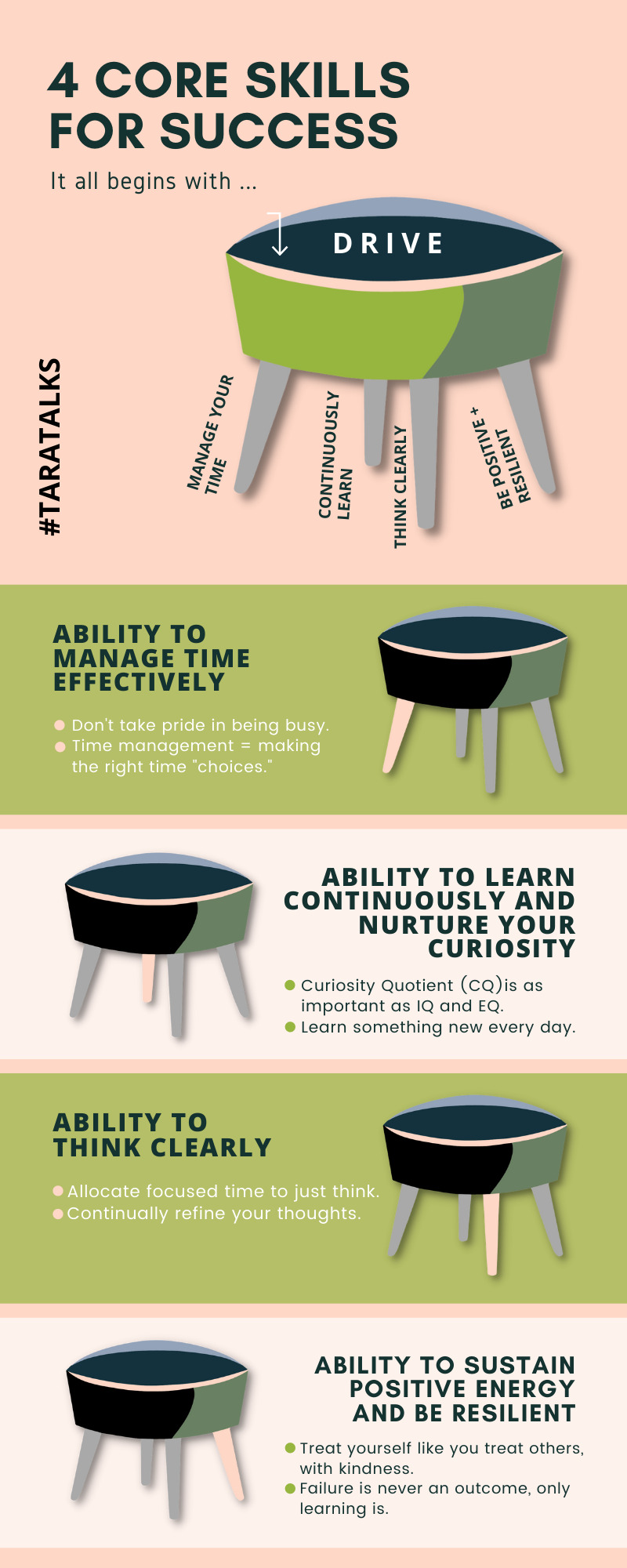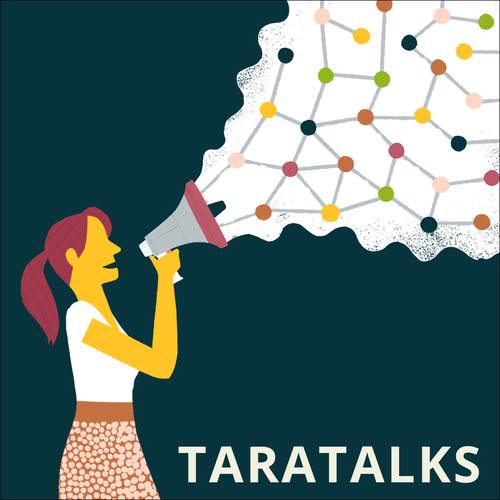We attribute many capabilities such as excellent communication skills, open mindedness, EQ, ability to connect with people, empathy, decision making abilities, grit, judgement, influence, strong work ethic (CORE LEADERSHIP SKILLS) etc. to successful leaders and people in all walks of life.
In this TARATALK interview Vijaya Kazans delves beyond these immediate capabilities to discover the 4 fundamental pillars that are at the root of most of these capabilities. “It all begins with ‘drive.’ Drive is that innate urge to attain a goal or achieve something,” explained Vijaya. “If you don’t have drive, the rest of the skills training doesn’t matter at all.”
Assuming the drive is there, practicing and getting better at these 4 core abilities is a necessity for everyone regardless of whether they are a CEO, engineer, student or a homemaker, including:
- Managing time effectively
- Learning continuously and nurture your curiosity
- Thinking clearly
- Sustaining positive energy and being resilient
“These aren’t skills that you learn once and are done with,” she said. “These are lifelong skills. Like yoga, the more you practice, the better you get at them. I’m still practicing these, but I’m happy to share what works for me.”
The 4-legged stool of success
“It is easy to visualize these capabilities as a 4-legged stool with “drive” as the base, and these 4 core capabilities as the 4 legs supporting this drive to succeed,” explained Vijaya.

The 4-legged stool of CORE LEADERSHIP SKILLS
Let’s start with the base…
It all begins with drive. “Drive is that innate urge to attain a goal or achieve something,” said Vijaya. “If you don’t have drive, the rest of the skills training doesn’t matter at all.” If “drive” is the base, to be transformed into a “footstool” requires four strong leadership “legs.”
1. Ability to manage time effectively. This is a core capability and doing it well demonstrates many other critical skills needed for success such as the ability to prioritize effectively, the ability to scale oneself and take on more responsibilities, good judgment, decision making, discipline and strong work ethic.
“We all have just 24 hours in a day, and we can’t manufacture time, no matter who you are, right?” she asked. “So, it really is about making the right time decisions and choices. And once you start thinking along those lines, you’re in control of your time.”
TIPS: Write down what you have to achieve and place these tasks in different priority buckets. “Don’t just go with the flavour of the day!” advised Vijaya. “Review this list often.” When reviewing it, Vijaya recommended you use the “Start, stop & continue method.” “Look at your list and ask, ‘What can I start doing? What can I stop doing? What should I continue to do?’ It’s a very simple framework, but it puts things in perspective.” And don’t make the mistake of applying the same effort on every task. For some things, you don’t need to strive for perfection. Apply the 80:20 rule and set appropriate time limits. Another important consideration is, “Is there something that I can do today that will give me multiplier effects tomorrow (example: hiring great people)?” If so, prioritize those efforts.
2. Ability to learn continuously and nurture your curiosity.
We tend to think about IQ being important, but our curiosity quotient CQ is equally important if not more important because it is at the root of many other attributes necessary for success such as growth mindset, open mindedness, intuition, adaptability and even empathy. Nobody is born with all the skills that are necessary for any profession, and being a lifelong learner will make all the difference. “It’s not about having the right skills for a job, but about having the skills to learn those skills,” noted Vijaya. “That’s where curiosity and continuous learning come in.”
TIPS: Spend an hour or even 30 minutes learning something new every single day. Be open to new ideas. Ask a lot of questions and learn from every situation—good or bad. It develops your intuition over a period of time. “Intuition isn’t something that falls in your lap,” explained Vijaya. “If you are curious to learn from every person and situation, you develop intuition and pattern matching that you can apply to all these sorts of situations.” Also, be curious about people and their situations. That helps develop empathy.
3. Ability to think clearly. “Having information and synthesizing the information are two different things,” noted Vijaya. You need to set aside time to think deeply during the day. If you’re always running from meeting to meeting, you’re taking in information, but there’s no time to synthesize. This ability is core to many other skills such as written and verbal communication, judgment, the ability to influence and motivate, and the ability to make sound decisions.
TIPS: Set aside time for deep work. Write things down, work and rework an idea again until you distill it to a point where you can clearly explain it to others in simple terms. Test your ideas on several people to get feedback and refine your key message
4. Ability to sustain positive energy and be resilient. The ability to sustain positive energy and be resilient through the inevitable ups and downs in life is perhaps the most important attribute one needs to be successful. This leads to several other traits such as the ability to inspire and motivate others, the ability to exude confidence and enthusiasm, the ability to attract and retain great people, and the ability to develop strong relationships.
TIPS: So how do you develop this skill? “One thing I often say is to treat yourself like you treat others,” Vijaya explained. “When we give feedback to others, we try to be very gentle and kind, making sure we choose our words carefully and our message lands well. Yet, we can be very harsh on ourselves. So, part of keeping this positive energy is to be kind to ourselves like we are to others. To be resilient, think about each experience as a learning opportunity rather than as a failure or a success. It’s really about what you can take away from each experience and how you can improve CORE LEADERSHIP SKILLS.”
Taking vacations regularly is great, but even better is to have what Vijaya calls “micro-targeted” moments of happiness or joy throughout the day so you never let negative energy accumulate. Do something that makes you smile, feel relaxed and happy like spending time with friends and loved ones or helping elevate others. This reduces stress, which, if unchecked, will always drain your energy.
Vijaya’s STEM STORY
“I was always interested in science and math as I was growing up, but never really considered doing engineering because my family couldn’t afford the tuition, and I did not think that was an option for me,” she explains. However, at her friend’s insistence she took the engineering entrance exam at the last minute, without any prior plan or preparation. As destiny would have it, she ended up getting into engineering school. After securing loans and promising her family she’d attend a school close to home so she didn’t have to pay for any dorm expenses, Vijaya went off to become an engineer. Today, she’s the Chief Security Officer, Head of Engineering & Data Science for Trust and Safety at Airbnb. She has a mantle of commendations, including being named one of the Top 25 Women in SaaS for 2018 and Top Revolutionary Women in Security 2019.
To know more about core leadership skills, join Gotara and receive advice from top STEM+ leaders.




